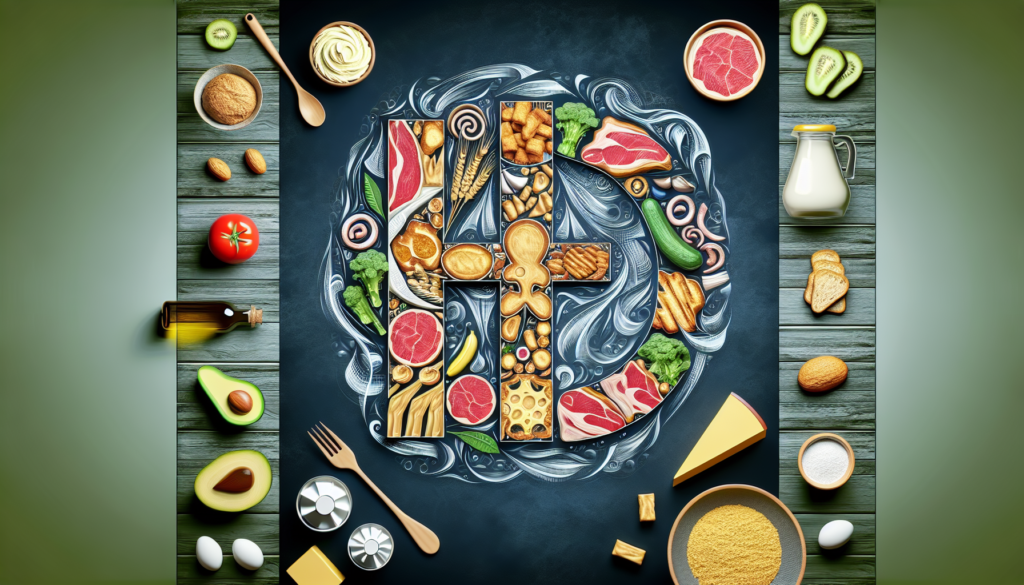Hey there! Want to learn all about the keto diet and what foods you can enjoy on this popular eating plan? Look no further than this comprehensive guide to the keto diet food list. We’ll break down everything you need to know about the keto diet, its benefits, and provide a detailed list of all the delicious and nutritious foods you can incorporate into your daily meals. Whether you’re a beginner to the keto lifestyle or a seasoned pro, this article has got you covered. So, grab a pen and paper, because you’re about to embark on a mouthwatering journey into the world of keto-friendly foods!

Important things to know about the Keto Diet
What is the Keto Diet?
The Keto Diet, short for ketogenic diet, is a low-carb, high-fat eating plan that has gained popularity over the years. It involves drastically reducing your carbohydrate intake and replacing it with fats. This dietary shift puts your body into a metabolic state called ketosis, where it becomes incredibly efficient at burning fat for energy. The primary goal of the keto diet is to get your body into ketosis and maintain it as a long-term lifestyle change.
Benefits of the Keto Diet
There are several benefits associated with the Keto Diet that have made it a popular choice for many people:
-
Weight Loss: One of the main reasons individuals turn to the keto diet is for weight loss. By minimizing carbohydrate intake and focusing on healthy fats and proteins, the body switches from burning carbohydrates to burning fat for fuel. This can lead to effective and steady weight loss.
-
Improved Mental Clarity: The keto diet has been shown to improve cognitive function and mental clarity. When in ketosis, the brain utilizes ketones as an energy source, which many people report enhances focus, concentration, and overall mental performance.
-
Stable Energy Levels: Unlike the constant ups and downs associated with high-carb diets, the keto diet can provide a more stable and consistent energy level. By relying on fat as the primary source of fuel, blood sugar levels remain stable throughout the day, preventing energy crashes.
-
Reduced Inflammation: The keto diet can have anti-inflammatory effects due to the reduction in processed foods, sugars, and refined carbohydrates. This can be particularly beneficial for individuals suffering from chronic inflammation-related conditions.
-
Potential for Disease Prevention: Some studies suggest that the keto diet may have positive effects on various health conditions, including heart disease, diabetes, epilepsy, and certain types of cancer. However, more research is needed to fully understand these potential benefits.
Potential Risks and Side Effects
While the keto diet can be highly effective for many individuals, it’s important to be aware of the potential risks and side effects:
-
Keto Flu: When transitioning to the ketogenic diet, some people experience what is commonly known as “keto flu.” Symptoms may include fatigue, dizziness, irritability, and brain fog. These symptoms usually subside within a few days to a couple of weeks as the body adapts to using ketones for fuel.
-
Nutritional Deficiencies: Restricting carbohydrates may limit the intake of certain vitamins, minerals, and fiber-rich foods. It’s important to carefully plan your meals and ensure you’re getting a variety of nutrient-dense foods to minimize the risk of deficiencies.
-
Digestive Issues: The high-fat nature of the keto diet can potentially lead to digestive problems such as constipation or diarrhea. It’s essential to drink plenty of water and incorporate fiber-rich vegetables to maintain a healthy digestive system.
-
Risk of Nutrient Imbalances: The heavy reliance on fats in the keto diet may lead to an imbalance in the ratio of omega-3 to omega-6 fatty acids. It is crucial to incorporate sources of omega-3 fatty acids, such as fatty fish and flaxseeds, to maintain a healthy balance.
-
Difficulty Sustaining the Diet: The strict carbohydrate restriction of the keto diet may make it challenging for some individuals to stick to the plan in the long term. It’s important to find a balanced approach that works for your lifestyle and health goals.
Keto Diet Food List
Now that you understand the basics and potential benefits of the keto diet, let’s explore the various food groups that are typically included in the diet:
Fats and Oils
On the keto diet, fats and oils make up a significant portion of your daily calorie intake. Here are some healthy fats and oils to include:
- Avocado oil
- Coconut oil
- Olive oil
- Butter
- Ghee
- Lard
- Duck fat
- Bacon fat
- Tallow
- MCT oil
These fats and oils can be used for cooking, salad dressings, or as a source of healthy fats in your meals.
Proteins
Protein plays a crucial role in the keto diet as it supports muscle growth, repair, and overall body function. Here are some protein sources to consider:
- Beef
- Poultry
- Pork
- Lamb
- Fish and Seafood
- Eggs
- Organ Meats
- Plant-Based Proteins (e.g., tofu, tempeh)
- Processed Meats (opt for unprocessed options like bacon or sausage without added sugars or fillers)
Ensure you opt for quality protein sources and include a variety of options in your meals.
Vegetables
While the focus of the keto diet is on fats and proteins, it’s essential to include low-carb vegetables to ensure a well-rounded diet. Here are some vegetable options:
- Leafy Greens (e.g., spinach, kale, lettuce)
- Cruciferous Vegetables (e.g., broccoli, cauliflower)
- Squash and Zucchini
- Bell Peppers
- Avocado
- Tomatoes
- Asparagus
- Green Beans
These vegetables provide essential vitamins, minerals, and fiber while keeping carbohydrate intake in check.
Fruits
Fruits should be consumed in moderation on the keto diet due to their higher natural sugar content. However, there are some low-carb fruit options to enjoy:
- Berries (e.g., strawberries, raspberries, blackberries)
- Lemon
- Lime
- Tomato
- Coconut
- Olives
These fruits can be enjoyed as occasional treats or used to enhance the flavor of certain dishes.
Dairy
Dairy products are a good source of protein and fat on the keto diet. Here are some dairy options to consider:
- Cheese
- Heavy Cream
- Sour Cream
- Plain Greek Yogurt
- Cream Cheese
- Butter
- Whole Milk
- Cottage Cheese
- Soft Cheese
- Hard Cheese
Opt for full-fat dairy products and be mindful of your serving sizes to avoid excessive carbohydrate intake.
Nuts and Seeds
Nuts and seeds are nutritious and provide healthy fats, fiber, and protein. Here are some keto-friendly options:
- Almonds
- Macadamia Nuts
- Walnuts
- Pecans
- Hazelnuts
- Flaxseeds
- Chia Seeds
- Hemp Seeds
- Pumpkin Seeds
- Sunflower Seeds
Nuts and seeds make excellent snacks or can be incorporated into various recipes for added texture and flavor.
Condiments and Seasonings
To add flavor to your meals, you can use a variety of condiments and seasonings. Here are some keto-friendly options:
- Salt
- Pepper
- Herbs
- Spices
- Vinegar
- Mustard
- Mayonnaise
- Hot Sauce
- Soy Sauce
- Sugar-Free Ketchup
These condiments and seasonings can enhance the taste of your dishes without adding unnecessary carbohydrates.
Beverages
On the keto diet, it’s crucial to stay hydrated. Here are some keto-friendly beverage options:
- Water
- Sparkling Water (unsweetened)
- Coffee
- Tea (unsweetened)
- Herbal Tea (unsweetened)
- Bone Broth
Minimize your intake of sugary drinks, fruit juices, and alcoholic beverages when following the keto diet.
Sweeteners
While sugars and artificial sweeteners are typically avoided on the keto diet, there are some natural sweeteners you can use in moderation:
- Stevia
- Erythritol
- Monk Fruit Extract
- Allulose
Use these sweeteners sparingly when needed, as they may still have an impact on blood sugar levels.
Foods to Avoid
To maintain ketosis, it’s important to avoid certain foods that are high in carbohydrates. Here are some foods to steer clear of on the keto diet:
- Grains (e.g., wheat, rice, oats)
- Starchy Vegetables (e.g., potatoes, corn, peas)
- Sugar (including honey, maple syrup, and agave)
- Processed Foods (highly processed snacks, fast food)
- Sugary Fruits (e.g., bananas, grapes, oranges)
- Legumes (e.g., beans, lentils, chickpeas)
- Highly Processed Oils (e.g., vegetable oil, corn oil)
- Alcohol (high in carbs and may hinder ketosis)
- Diet Soda (artificial sweeteners can still impact blood sugar)
- Low-Fat Dairy (opt for full-fat dairy on the keto diet)
By avoiding these foods, you can maintain a low-carb lifestyle and maximize your chances of achieving and maintaining ketosis.
In summary, the keto diet is a low-carb, high-fat eating plan that focuses on achieving and maintaining ketosis. It offers several potential benefits, including weight loss, improved mental clarity, stable energy levels, reduced inflammation, and potential disease prevention. However, it’s important to be aware of the potential risks and side effects associated with this diet. By following the keto diet food list and including a variety of fats, proteins, low-carb vegetables, and moderate fruit and dairy options, you can tailor your meals to support your health goals while minimizing carbohydrate intake. Remember to consult with a healthcare professional or registered dietitian to ensure the keto diet fits your specific needs and goals.

Hi! My name is Linda, and I’m a health and fitness specialist. I’m passionate about helping people live their healthiest and happiest lives. In my articles I share my knowledge and experience on all things health and fitness. With a passion for writing and a deep understanding of the health and fitness landscape, Linda has established herself as a trusted authority in the field.